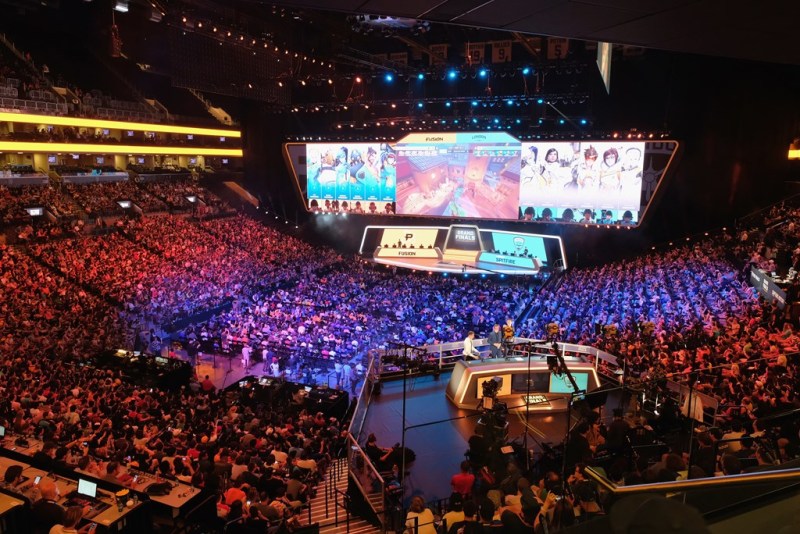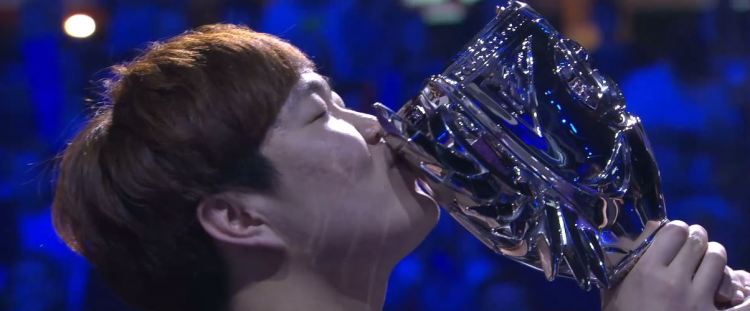Bigger isn’t better. That’s the refrain I constantly repeat when discussing esports, because too many people seem to think more money or a bigger audience is the same as meaningful improvement. In 2018 — like in every year in recent memory — esports got bigger, but what if that isn’t enough?
Yes, growth is good — and if you’re an esports fan, it’s easy to see the past year as a series of victories. 2018 was a banner year in almost every regard, and certainly by the metrics that the esports industry has come to espouse: More prize money than any year prior found its way into the hands of an increasing number of players in new games and old alike. Major tournaments sold out massive stadiums all over the world. The industry grew to an estimated $900 million this year, with athletes and musicians from Michael Jordan to Drake investing lump sums in a variety of esports organizations, and estimates suggest that number could rise to $1.7 billion by 2021.

Above: Tina Perez (left) and Madison Mann are part of Gen.G’s Fortnite team.
You can’t have a conversation about the gaming landscape without discussing the runaway success of Epic’s Fortnite, and while much of that discussion centers around parenting techniques and Tyler “Ninja” Blevins, Epic also made a grandiose statement about esports – namely, financial support to the tune of $100 million (which, while meant to support a year or more of tournaments, still dwarfs Valve’s Dota 2 International prize pool of $25 million in headlines). That kind of number is unprecedented, and a level of investment signalling Epic certainly sees value in their game’s perception as an esport.
But all of this growth hasn’t borne out in the ways that are meaningful or sustainable. Investment and sponsorship money continues to pour in, but valuations are trading at levels that revenues don’t support. Epic can afford to declare that they’ll spend a nine-figure sum on Fortnite esports because the game itself made $3 billion in profit in 2018, not because there’s the remotest chance their tournament events and broadcasts will recoup those costs.
June 5th: The AI Audit in NYC
Join us next week in NYC to engage with top executive leaders, delving into strategies for auditing AI models to ensure fairness, optimal performance, and ethical compliance across diverse organizations. Secure your attendance for this exclusive invite-only event.
The problem here is that while a game is successful, the developer will spend some fractional portion of their budget on the occasional spectacle of tournaments, trophies, and a couple of oversized checks. The esports themselves aren’t solvent, and that puts anyone whose paycheck relies on them in a precarious position. Careers in esports were already notorious for their brevity, but 2018 saw some cut shorter than most by the unceremonial and abrupt cancellation of the programs for Heroes of the Storm — not the first example (H1Z1 fared no better earlier in the year), but also certain not to be the last.
Behavioral issues

Above: The Landing event complex in Jacksonville, Florida where the Madden competition took place.
Growth isn’t the solution to those problems, though. Growing up — maturing past the nascent, Extremely Online beginnings of esports — is.
2018 wasn’t the year that players unionized to protect themselves. Say what you will about the players association for your sport of choice, but it exists to ensure that players are treated fairly, which no esport can currently say they do.
The tragic event in Jacksonville in August was a wake-up call for a lot of people in the industry. Esports organizers have since dealt with the reality that they are not immune to the security threats of any other event, and they are now reacting in kind. Taking the security of players and fans seriously is the absolute minimum that is acceptable.
If the physical security of events being in question weren’t enough, esports still hasn’t shed the unfortunate bits of its proverbial skin. Notorious for its failures to be welcoming or inclusive, esports can’t seem to stand up to the handful of bad actors that continue to drag the whole industry’s reputation through the mud. A glimpse at this story on Waypoint — to say nothing of the abhorrent vitriol it sparked on social media and elsewhere — speaks for itself. That the specters of 2014 and this kind of behavior are still news in 2018 remains one of the many real problems underpinning what’s holding esports back.
What, then, of the successes of someone like Dominique “SonicFox” McLean? While it’s enormously powerful to see SonicFox appear on stage (“I’m gay, black, [and] a furry,” he said during The Game Awards), there’s something affectatious about how he (or one of a tiny handful of other players) are held up over and over again as the (often lone) symbolic representatives of diversity in these spaces. Esports needs more inclusion, and weaponizing the few authentically diverse folks competing as if to say, “But we already have diversity!” is a mistake.
Leaving the kids table

Above: The Overwatch League Grand Finals show esports is doing just fine, thank you
We’re at an interesting juncture for esports. Every year, playing video games competitively as a profession seems a little more realistic, and slightly more deserving of its praise; for all its successes, though, esports fundamentally remains a kid asking for a seat at the adult table.
Delicately moving the needle in core demographic audience size or slight upticks in revenue won’t move esports forward. We need consequential cultural victories. We need scenes that are not only more and increasingly diverse, but accepting of that diversity. We need to leave the ugliness of years of oppressive rhetoric, chat memes, and the juvenile incivility so often characterized as a necessary evil of anything online behind.
In 2019 and beyond, the accessibility of esports to wider, more mature audiences will matter. Fans need to reject toxicity and push players, talent, teams, organizers, developers, and publishers to be more accountable. If esports is to thrive, rather than merely survive, these are the difficult, long-term challenges that must be addressed.


